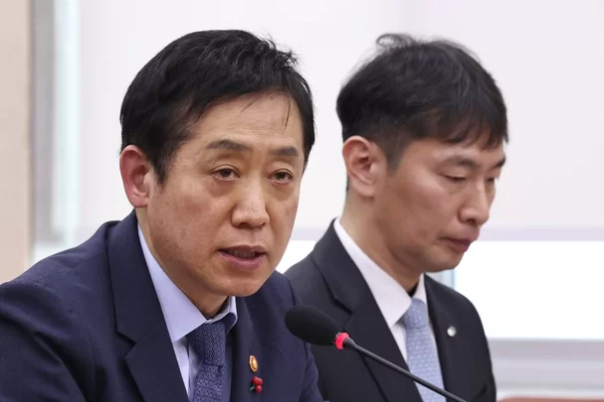The South Korean financial regulator announced basic guidelines under the so-called corporate value-up program on Monday, with measures to boost the values of listed firms, set up indices for their value rise and create an exchange-traded fund (ETF) using the index.
Under the guidelines of Korea’s Financial Services Commission (FSC), about 1,600 firms on the main bourse Kospi and the junior Kosdaq will voluntarily establish their corporate value enhancement plans and disclose them with self-assessment at least once a year.
The disclosure will consist of three major steps: market value analysis and evaluation of whether the value is at an appropriate level; disclosure of the company’s mid- to long-term target value and timeline to reach the goal; and disclosure of the implementation status from the second year of the plan.
By the end of June, the government will finalize the guidelines including a plan of tax incentives for companies that boost their values by treasury stock retirement or dividend payouts. The government will also award prizes to outstanding firms every year that best follow guidelines.
DETAILS FOR DISCLOSURE The government will form an index based on each firm's key indicators such as price-book-value ratio (PBR) and price-earnings (P/E) ratio and create an ETF tracking the index.
This aims to create a market environment where companies actively work to increase their value, FSC said.
The authorities will add the companies' efforts to increase their values to local institutional investors’ stewardship code.
The government will provide listed companies’ key indicators such as PBR, P/E ratio and return on equity (ROE) on a quarter basis on the Korea Exchange website. It will also announce the companies' annual dividend payout ratios and dividend yields every May.
Investors will be able to view corporate value and companies’ value investment plans online. The government will publish a white paper that includes each firm’s implementation level and analysis of how their efforts lead to improvements in the key indicators.
EASE OF "KOREA DISCOUNT"The program aims to support listed firms to improve their capital efficiency and increase shareholder returns.
This measure is to ease the so-called “
Korea discount,” which refers to Korean stocks being traded at prices lower than their fundamentals, the government said.
According to FSC, the PBR of Korean shares was 1.05 times as of the end of last year, almost the same as 1.04 of the recent 10-year average. It compares with 1.58 times on average from emerging markets and 2.5 times from developed markets over the last decade.
In terms of dividend payout ratios on a 10-year average, Korea posted 26%, compared with emerging markets’ 39.6% and developed markets’ 49.5%. By ROE, Korea logged 5.2% as of end-2023; emerging and developed markets posted 10.8% and 14.3%, respectively.
FSC said it will actively promote the program to encourage companies to boost their values and respect shareholder value. These will ultimately contribute to the improvement of the domestic stock market and economic growth, the financial regulator added.
Write to Han-Gyeol Seon at
always@hankyung.com
Jihyun Kim edited this article.





